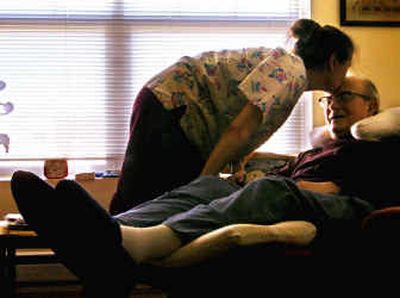High court to hear assisted suicide case

WASHINGTON – The Supreme Court agreed Tuesday to decide whether the federal government can block a state’s right-to-die law, setting the stage for a debate that tangles issues of individual liberty, federal authority and personal privacy.
The justices said they’ll review a lower court decision that barred the Bush administration from using federal prescription drug laws to override Oregon voters’ wishes to allow doctors to help terminally ill patients die more quickly. Oregon is the only state with such a law.
The high court will hear the case in the fall, when the 2005-2006 term begins, and issue a ruling by spring 2006.
Right-to-die advocates were disappointed by Tuesday’s announcement and had hoped that the 9th Circuit Court of Appeals ruling that curbed the Bush administration’s authority would be the final word.
“I am disappointed,” Oregon Gov. Ted Kulongoski said. “The people of Oregon have approved Oregon’s Death with Dignity Act not once, but twice, and the lower courts have upheld Oregon’s law not once, but twice.”
But groups that oppose assisted suicide said the court’s decision gives the justices a chance to reassert federal supremacy on this issue.
“A state may have power to exempt physicians from liability under state law, but it cannot exempt physicians from federal law,” said Denise Burke, senior litigation counsel at Americans United for Life. “Lower court rulings, to the contrary, appear to go out of their way to override traditional federal drug controls. Killing, either by consent or not, is never therapeutic.”
The case dates to 2001, when then-Attorney General John Ashcroft reversed a Clinton Justice Department policy that refused to challenge the Oregon law. Saying there was “no legitimate medical purpose” for prescribing drugs that could end a patient’s life, Ashcroft announced that the Bush administration would seek to punish doctors who engaged in assisted suicide.
Oregon officials argued that regulation of medical practice has historically been a state power and that the Bush administration was overstepping its authority by trying to undo voters’ will. Oregonians twice approved the assisted suicide law.
Two lower courts sided with the state. Ashcroft filed an appeal from the 9th Circuit’s decision in November.
The case plunges the high court justices into a socially charged issue that they’ve confronted before.
In a 1997 ruling, the court declared that there was no constitutional right to die. But the justices also left the door open in that ruling for states to decide on the issue.
The court also was asked recently to get involved in the Florida case of Terri Schiavo, a 1990 heart-attack victim whose husband wants to remove the feeding tubes that keep her alive. Gov. Jeb Bush asked the justices to let him enforce a law that would save Schiavo’s life, but the high court declined. She could be removed from life support as early as today. .
The Oregon case presents the court with the challenge of defining and separating several thorny issues.
Court conservatives have made a hallmark of their work to roll back the federal government’s ability to interfere in matters the Constitution leaves to states. Liberal jurists typically have opposed those efforts.
But in this case, siding with the state would also mean accepting assisted suicide, which won’t sit well with social conservatives. And asserting federal dominance would mean impinging on personal liberty, which wouldn’t sit well with liberals. Cases such as these tend to reveal the extent to which the justices adhere to their views of the Constitution, rather than their political inclinations.
The court faces a similar challenge in a case heard this term in which the Bush administration challenged California’s medical marijuana law. A decision could come any day.